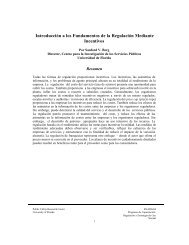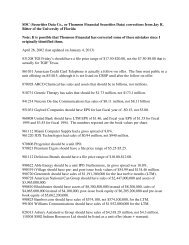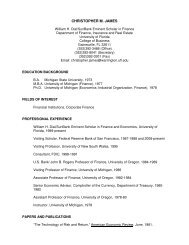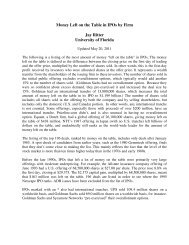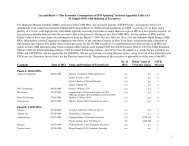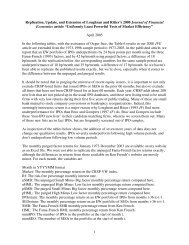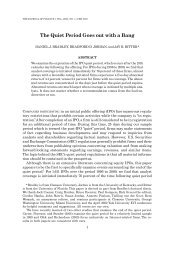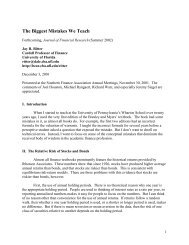Initial Public Offerings Jay R. Ritter Cordell Professor of Finance ...
Initial Public Offerings Jay R. Ritter Cordell Professor of Finance ...
Initial Public Offerings Jay R. Ritter Cordell Professor of Finance ...
You also want an ePaper? Increase the reach of your titles
YUMPU automatically turns print PDFs into web optimized ePapers that Google loves.
The National Association <strong>of</strong> Securities Dealers (NASD) sets limits on underwriter<br />
compensation. One way that underwriters may overcome the limits on direct compensation set<br />
by the NASD and state regulators is to include warrants to purchase additional shares as part <strong>of</strong><br />
the compensation <strong>of</strong> the investment banker. Underwriter warrants tend to be associated with<br />
smaller and riskier issues and low-quality underwriters. Since Table 5 does not include<br />
underwriter warrants as a cost <strong>of</strong> going public, their inclusion would boost the average costs<br />
associated with smaller <strong>of</strong>ferings. In other words, Table 5 understates the economies <strong>of</strong> scale<br />
that exist.<br />
7.4 Direct public <strong>of</strong>ferings<br />
Beginning in the mid-1990s, a growing number <strong>of</strong> small companies have gone public<br />
without using an investment banker in what have come to be called direct public <strong>of</strong>ferings<br />
(DPOs). According to one count, 190 companies attempted to raise $273 million during 1996<br />
using direct public <strong>of</strong>ferings. Some <strong>of</strong> these have been consumer product companies (i.e.,<br />
microbreweries) where the target shareholders have been customers <strong>of</strong> a company’s product. An<br />
advantage for an issuing firm <strong>of</strong> a direct public <strong>of</strong>fering is the possibility <strong>of</strong> reduced costs.<br />
Investors must be wary, however, <strong>of</strong> the lack <strong>of</strong> a third party (i.e., underwriter) putting its<br />
reputation on the line, especially as regards due diligence and valuation.<br />
8. Summary<br />
Companies going public, especially young companies, face a market that is subject to<br />
sharp swings in valuations. Pricing deals can be difficult, even in stable market conditions,<br />
because insiders presumably have more information than potential outside investors. To deal<br />
with these potential problems, market participants and regulators insist on the disclosure <strong>of</strong><br />
material information.<br />
Three patterns have been documented for IPOs in the U.S. and many countries: i) new<br />
issues underpricing, ii) cycles in volume and the extent <strong>of</strong> underpricing, and iii) long-run<br />
underperformance. In some respects, the poor performance <strong>of</strong> IPOs in the long run makes the<br />
new issues underpricing phenomenon even more <strong>of</strong> a puzzle.<br />
The U.S. IPO market is enormous in comparison with that <strong>of</strong> most countries. The<br />
contrast with continental Europe is especially noteworthy. Part <strong>of</strong> the difference is undoubtedly<br />
cultural: the willingness <strong>of</strong> U.S. employees to work for young, unstable companies makes it<br />
easier to start a firm. Venture capitalists are willing to finance these firms, knowing that an<br />
active IPO market will allow them to cash out if the startup firm succeeds. Because <strong>of</strong> the<br />
immense number <strong>of</strong> U.S. IPOs, a large infrastructure has developed to create and fund young<br />
companies, especially in the high technology sector.<br />
In addition to liquid labor markets, the large volume <strong>of</strong> IPOs in the U.S. can be partly<br />
attributable to a legal system that protects, albeit imperfectly, minority investors. Yet another<br />
23




